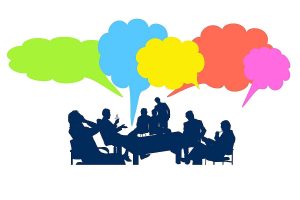Katri Mäkinen-Rostedt

Critical consciousness and enhanced mutual understanding (Armitage, 2011) are built through social learning, i.e., deliberative learning in collaborative or participatory settings. Inclusivity and reflexivity are key tightly coupled elements of this kind of learning process. Inclusivity embraces greater plurality in how we conceptualize and understand the world, and reflexivity implies critically assessing our own assumptions and positions as part of the world. This means that inclusivity as an aim in organizations, projects and governance requires questioning of normative beliefs, positions, and power relations. Similarly, associating a demand to ‘be reflexive’ in research projects insinuates that people become aware especially via social interaction with others, either fellow researchers or non-academics, of their own and other’s assimilated beliefs and values.
Our recent study on the “real-world” learning pathways that occurred during the Intergovernmental Science-Policy Platform on Biodiversity and Ecosystem Services IPBES Values Assessment process revealed how individual’s understandings change in transdisciplinary processes due to social interactions and increased reflexivity. We learned that one of the main catalysts for any learning path towards reflexivity in the IPBES context was the experienced diversity of perspectives. Diversity appeared in different ways during the process: diversity was experienced in contexts (political, organizational, historical, cultural) and in the expressed values, worldviews, disciplines, and knowledge. Whether individuals had gained new knowledge, better cooperating skills, changed their understanding or received better awareness of other’s thinking, it was all enabled through social interactions.
Hence, organizations which want to support inclusive knowledge creation processes should invest in developing their mechanisms for both individual and group -level learning. Organizational practices that can support learning pathways to reflexivity can include, for example, systematic evaluations of different learning outcomes and various cooperative practices such as guided questions, active listening, or real-world labs. Because inclusivity adds a plurality of views and meanings during the process and of the process, it is equally important to keep the learning processes open. Open processes embrace the process rather than the outcome, accepting that some of the outcomes of the process might also be negative and unpredictable (Hakkarainen et al., 2020).
This writing is based on the manuscript currently under review.
About the Author
In spring 2021 Katri Mäkinen-Rostedt spent four months in the Human-Nature Transformations Group as a Senior Project Manager. She worked, e.g. with IBPES-related research project on expert’s understandings on multiple values of nature and supporting the group with project planning activities. She is a Ph.D. Candidate at Tampere University. Her PhD project concerns the use and construction of expert knowledge in global environmental governance. Her current interests include social network analysis and various knowledge creation practices (such as co-production of knowledge) used in different international and regional science-policy interfaces. You can follow Katri on Twitter or ResearchGate.
References
Dale, A., Armitage, D., 2011. Marine mammal co-management in Canada’s Arctic: Knowledge co-production for learning and adaptive capacity. Marine Policy, 35(4), 440–449. DOI: https://doi.org/10.1016/j.marpol.2010.10.019
Hakkarainen, V., et al., 2020. The other end of research: exploring community-level exchanges in small-scale fisheries in Zanzibar. Sustainability Science, 15(1), 281–295. DOI: https://doi.org/10.1007/s11625-019-00750-4
Picture: Wikimedia Commons